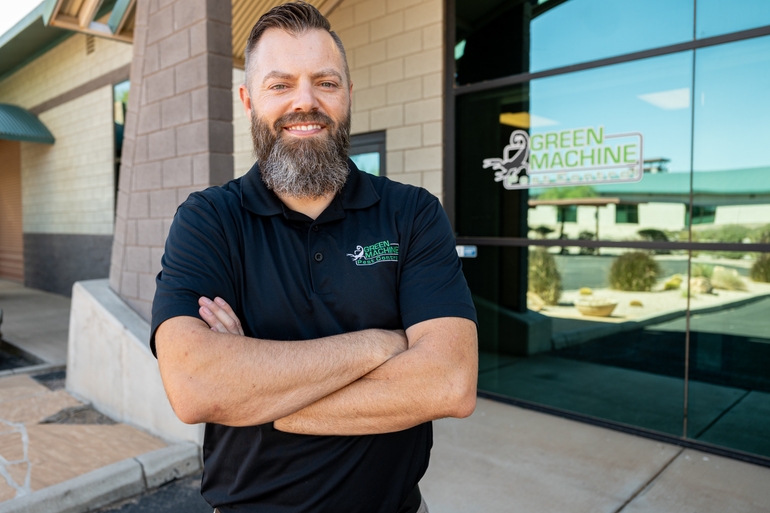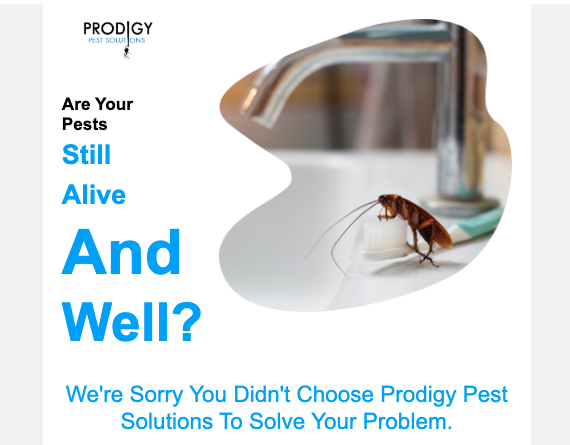How to Grow Your Pest Control Business (12 Proven Tips)

Growing a pest control business involves more than handling infestations—it requires strategic planning, effective marketing, and the right tools. This guide outlines 12 proven strategies to help you attract more customers, streamline operations, and boost revenue.
1. Improve Your Online Presence
Build trust with potential customers by creating a professional website, optimising for mobile, and maintaining active social media and Google Business Profile listings.
2. Boost Digital Marketing & Direct Advertising
Utilize a combination of SEO, pay-per-click ads, and direct mail to target homeowners actively seeking pest control marketing services.
3. Local Partnerships and Community Engagement
Partner with local businesses and real estate agents, and attend community events to increase brand visibility and referrals.
4. Expand Geographical Reach
Grow your service area strategically by targeting nearby markets with high demand and low competition.
5. Customer Referral Program
Encourage word-of-mouth referrals by offering rewards or discounts to satisfied customers who bring in new leads.
6. Consider Extra Services to Add to Your Pest Control Business
Add value by offering eco-friendly treatments, mosquito control, or wildlife removal services that broaden your appeal.
7. Develop Recurring Revenue Models
Offer seasonal plans and bundled pest control services to increase customer retention and generate predictable income.
8. Create Targeted Service Packages
Design service tiers tailored to various pest problems or customer types, including homeowners and property managers.
9. Employee Training and Certification
Invest in technician training and licensing to enhance service quality, safety, and customer trust.
10. Leveraging Automation
Use pest control software to automate scheduling, invoicing, and follow-up, freeing up time to focus on growth.
11. Customer Reviews and Testimonials
Request online reviews and highlight testimonials to build trust and improve your local search ranking.
12. Networking and Industry Involvement
Stay competitive by joining pest control associations, attending relevant events, and staying informed about industry trends.
1. Improve Your Online Presence
Maintaining a strong online presence is a top marketing strategy for a pest control business to reach potential clients.
Having technicians who live in the local community helps build trust and ensures familiarity with local pest issues.
It is also essential to regularly review your online presence to ensure all information is accurate and up-to-date.
Website optimization
A successful pest control company website must strike a balance between technical capabilities and an appealing, intuitive user experience. The site should work reliably, offer optimized navigation, and offer compelling content marketing.
Above all, it should be optimized for mobile users. Nearly 63% of global web traffic comes from mobile devices. Ignoring this user experience could mean missing out on your ideal customer.
Search engine optimization (SEO)
Getting potential customers to your website is a challenge.
While social media reaches dedicated followers, 79% of website traffic globally comes from Google. SEO reaches a broader audience.
Effective SEO ensures that Google and LLMs (large language models like ChatGPT) crawl your site, understand its content, and rank it as highly as possible when people search. Here are three areas to focus on.
Keyword research: Business owners can leverage SEO tools to find high-volume, low-competition keywords. Use these in page titles, headings, and body copy to reach your target audience.
Local SEO strategies: Google’s local search algorithm factors in relevance, distance, and prominence. Therefore, ensure that you include localized details throughout your website and conduct localized keyword research.
On-page optimization: Beyond writing people-focused content as part of your marketing efforts, optimize your site. Use keywords in URLs, add internal and external links, and use optimized images and videos in terms of file size, file type, and dimensions.
Google Business Profile (formerly Google My Business)
Claim, personalize, and manage your pest control company’s Google Business Profile directly from Google. An active Google Business Profile will enable you to update your business listing information, manage customer reviews, and post updates and photos. A well-maintained profile ensures you’re engaging current and potential clients.
A robust online presence is important, but it is not the only critical pest control marketing strategy.
2. Boost Digital Marketing & Direct Advertising
You may have excellent pricing and reliable pest control services, but if potential customers can’t find you, there are growth stalls. That’s why effective digital marketing and direct advertising are essential for any pest control business looking to expand. Digital marketing can also help address a homeowner's pest problem quickly and efficiently by connecting them with the right solutions at the right time.
With the right mix of Google Ads, email marketing, and direct mail, you can reach more homeowners, improve your visibility, and increase conversion rates.
For example, Google Ads campaigns can target specific pest problems such as termites, rodents, or mosquitoes, ensuring your ads reach those who need your services most. FieldRoutes Marketing Pro offers an all-in-one platform to manage and optimize these campaigns in real-time, helping pest control business owners streamline their marketing efforts and maximize ROI.
Let’s explore how each tactic works.
If you have any questions about our pest control services, current offers, or how we can help with your pest problem, please contact us today.
Google Ads
Google Ads helps your pest control company appear when people search for solutions to common pest problems, such as termites, wasps, or bed bugs. With precise targeting, you can run campaigns that reach the right audience at the right time.
Highly targeted campaigns let you define your service area, customer demographics, and pest-specific searches.
Use keyword research to rank for terms like “exterminator near me” or “termite treatment.” Set bidding strategies to control spend and improve visibility.
Add ad extensions—such as location, callouts, and sitelinks—to enhance engagement and increase phone calls and website visits.
Enable conversion tracking to monitor which ads result in actual leads or new customers.
Marketing Pro simplifies campaign setup, ad performance tracking, and budget management—all in one place.
Email Marketing
Email marketing is a powerful tool for driving repeat business, promoting offers, and educating your customer base.
Segment your list by service history, zip code, or interest to send relevant offers and reminders.
Create automated campaigns for appointment confirmations, follow-ups, and service reminders to streamline your operations.
Share seasonal discounts, pest alerts, and limited-time offers to bring in new customers or re-engage dormant ones.
Build trust with helpful tips, local pest trends, and company updates.
With Marketing Pro, pest control businesses can launch email campaigns, personalise content, and track open and click rates to optimise future efforts.
Direct Mail
While digital marketing is essential, direct mail remains a highly effective way to connect with homeowners—especially in local markets.
Use targeted mailing lists based on homeownership, neighbourhood, or property age to reach people likely to need your services.
Design visually compelling postcards or flyers that highlight your pest control services, pricing, and seasonal offers.
Always include a clear call to action with a trackable phone number, landing page, or QR code for maximum effectiveness.
Measure response rates with unique promo codes or phone tracking to calculate ROI.
Marketing Pro helps pest control companies align their direct mail with digital campaigns, ensuring consistency and measurable results across all marketing channels.
Now let’s explore how building local partnerships and engaging with your community can further fuel your pest control company’s growth.
3. Local Partnerships and Community Engagement
For small businesses in the pest control industry, having a strong online presence is important—but it’s not enough. Building real-world relationships in your local market helps grow brand recognition, create trust, and generate word-of-mouth referrals that drive new business. Expanding your reach allows you to protect more homes from pest infestations, ensuring families feel safe and secure.
When your pest control company shows up consistently in the community, you position yourself as a trusted provider—not just another name in a search result.
Consider adding the following activities to your marketing plan:
Sponsor local events, youth sports teams, or school clubs to increase brand visibility and demonstrate community support
Host educational sessions on common pest issues, pesticide safety, or seasonal prevention tips to build authority and attract homeowners.
Partner with nearby local businesses—like landscapers, HVAC companies, or real estate agents—to offer bundled promotions or cross-referrals
Join clean-up initiatives or neighborhood beautification projects to connect with local homeowners face-to-face.
Offer community discounts or loyalty programs to help your services stand out in competitive areas.
In new service areas, highlight how regular pest control treatments can prevent pests from entering homes, providing added peace of mind for residents.
These efforts not only promote your pest control services but also help you build trust with potential customers who are more likely to remember you when infestations strike.
Next, let’s examine how expanding into new geographic areas can help your pest control business scale more quickly.
4. Expand Geographical Reach
Once your pest control business has a solid foundation in your primary service area, consider expanding into nearby markets to grow your customer base and increase revenue. Many pest control business owners find success by identifying underserved neighborhoods or outlying towns where local services are limited or inconsistent.
Targeted expansion enables you to serve new customers while increasing brand awareness and establishing a regional presence. Ensure that your team and resources are prepared to scale sustainably.
Here are some practical ways to expand:
Research nearby zip codes with pest issues but limited competition. Look for areas experiencing growth in real estate or commercial development.
Set up mobile teams or satellite offices to cover larger areas without incurring the full costs of a traditional branch. This helps reduce drive time and increase appointment availability.
Adapt your marketing strategies based on the location—termite infestations may be more prevalent in one region, while bed bugs or wasps may be more common in another.
Run local SEO campaigns and tailor your messaging to each community’s concerns. Highlight your license, response time, or eco-friendly options based on what matters locally.
You can also use FieldRoutes pest control software to manage routing, appointment scheduling, and invoicing across multiple locations, ensuring efficient operations as your business grows.
Let’s now explore how launching a referral program can generate high-quality leads and encourage repeat business.
5. Customer Referral Program
Word of mouth is one of the most powerful ways to grow a pest control business, primarily when a structured referral program supports it. Satisfied customers are often happy to share their experience, but they’re far more likely to do so when given a clear incentive.
In addition to standard services, offering a variety of pest control treatment options ensures you can address different customer needs, from routine yard care to targeted pest infestations.
Here’s how to build a successful referral program:
Offer a reward—such as a discount, free add-on service, or gift card—for both the referrer and the new customer.
Track referrals using digital tools to ensure both parties receive proper credit.
Promote the program across multiple channels, including email marketing, direct mail, and your online customer portal.
Provide physical leave-behinds after appointments to remind customers to share their positive experience with others.
Run limited-time referral drives tied to seasonal campaigns or follow-ups to encourage quick action.
You can also take inspiration from the FieldRoutes Referral Program, which makes it easy for partners to earn rewards for referring pest control companies to FieldRoutes. This model works because it’s automated, trackable, and mutually beneficial.
With the right strategy, a referral program can help generate high-quality leads, lower customer acquisition costs, and increase repeat business.
Up next, let’s consider how expanding your service offerings can attract a broader range of customers.
6. Consider Extra Services to Add to Your Pest Control Business
Adding new service offerings is a smart way to grow your pest control business. It enables you to increase the average transaction value, reach new audiences, and enhance customer retention by becoming a one-stop shop for property maintenance and pest prevention. Most recurring service plans start with a standard treatment, which serves as the foundation for ongoing pest management and establishes expectations for future services.
Before expanding, consider what your existing customer base may already need. Many homeowners and local businesses face recurring issues beyond basic pest control, providing an opportunity to upsell or cross-sell additional services.
Here are some strategic add-ons to consider:
Wildlife control and exclusion – Seal entry points, install barriers, and remove nuisance animals like squirrels or raccoons.
Mosquito and tick control – Add outdoor treatment plans during warmer months to reduce disease-carrying pests.
Bed bug and termite inspections – Offer specialized services for high-risk pests that often require certified expertise.
Lawn care and weed control – Treat yards to prevent infestations that begin outdoors, and upsell regular lawn maintenance.
Bin cleaning – Clean and sanitise outdoor trash bins to reduce odours and deter pests.
Pressure washing – Clean siding, patios, and decks to remove mould, algae, and organic debris that attract insects.
Window cleaning – Fill gaps during the slow season and serve existing clients with minimal extra equipment.
Home inspections – Help buyers and sellers identify pest issues early and recommend treatment plans.
Tree spraying – Target tree-specific pests and provide valuable seasonal services.
Junk removal – Clear clutter that can harbour rodents or insects, especially after tenant move-outs or renovations.
Fencing installation – Offer privacy fencing or wildlife barriers as an upsell to exclusion services.
Pool maintenance – Add pool chemical treatments or seasonal closings to reach more homeowners.
Recurring plans often include free re-treatments at no additional cost if pests return after the standard treatment, providing ongoing value and peace of mind to customers.
Each of these services can be marketed through your website, email campaigns, or direct mail. Tools like FieldRoutes Marketing Pro make it easier to manage these promotions and track customer engagement in real time.
Recurring pest control services are designed to effectively manage pest populations over time. These visits are typically scheduled monthly or quarterly to ensure consistent protection and address any new infestations as they arise.
Next, let’s examine how creating recurring revenue models can stabilize your income and enhance long-term customer relationships.
7. Develop Recurring Revenue Models
A steady cash flow is essential for growing any pest control business, and recurring revenue models make that possible. By offering subscription-based pest control services, you create a more predictable income stream while improving long-term customer retention.
Each control service package can be tailored to address specific pest issues, ensuring that customers receive the most effective and targeted solutions for their needs.
Instead of relying on one-time visits, offer monthly, quarterly, or annual service plans that focus on preventative treatments and follow-up inspections. This approach positions your business as proactive rather than reactive—and keeps your brand at the forefront of customers' minds.
Here are a few ways to structure recurring revenue models:
Subscription plans – Offer pest prevention services on a set schedule, billed monthly or annually. Include options tailored to common pests, such as termites, wasps, or bed bugs.
Customizable plans – Allow customers to choose packages that treat both inside and outside areas, ensuring comprehensive coverage of all spaces inside the home, as well as exterior zones.
Upselling seasonal add-ons – Promote extras like mosquito control or eco-friendly pesticide options. Use Marketing Pro to send targeted email campaigns that promote upgrades during peak seasons.
Engagement through retention – Regular touchpoints, such as appointment reminders and seasonal tips, reduce churn. Consistent service builds trust, increases repeat business, and lowers acquisition costs.
Recurring services also give you more opportunities to gather testimonials, request online reviews, and offer referrals, all of which feed back into your marketing engine.
Next, let’s explore how creating targeted service packages can help attract specific customer segments and increase the average transaction value.
8. Create Targeted Service Packages
As your pest control business grows, so should the way you structure and present your service offerings. One way to attract more homeowners, local businesses, and niche markets is by creating custom packages that address their specific needs. It's also essential to verify technician credentials to ensure your team is certified and qualified to deliver safe and effective pest control services.
Targeted service packages help potential customers understand what they’re getting and why it matters. This can improve conversion rates, support a more clever pricing strategy, and increase the average transaction value.
Consider offering:
Customizable plans – Tailor packages for residential, commercial, or multi-unit properties. Include solutions for common issues like rodents, termites, or seasonal infestations.
Flexible pricing tiers – Provide entry-level, mid-range, and premium plans to suit different budgets and pest pressures.
Location-specific services – Include packages that address regional concerns, like fire ant control in the South or wildlife removal in suburban areas.
Eco-conscious solutions – Offer low-impact, eco-friendly treatments as a premium option.
Pesticide Safety Training – Ensure your technicians are trained on the safe and effective use of pesticides, including proper application and understanding of label instructions.
With clear options and add-ons, you can attract more potential customers who feel the package fits their specific needs. You can also use tools like Marketing Pro to promote these plans through segmented email campaigns and targeted landing pages.
Next, we’ll look at how better employee training can help your team deliver more consistent service—and boost customer satisfaction. Advanced training also prepares technicians to handle challenging pest infestations that require specialized knowledge and skills. Additionally, eco-friendly pest control should always consider the environment, ensuring that all practices minimize impact and adhere to environmental safety guidelines.
9. Employee Training and Certification
A Google search for pest control may reveal hundreds of exterminator companies in your service area. So, having a well-trained team is a differentiator. You can advertise the certifications in your online presence, and more knowledgeable employees will naturally lead to better customer experiences.
Ongoing training enables your team to stay current with pest control industry standards and advancements in highly specialized areas. Options include:
Entomology
Rodent control
Wildlife management
Termite control
Fumigation
Consider obtaining a certificate for eco-friendly pest control as a green option. It will also be cost-effective. Still, with all these continuing education options, the reward of providing more effective pest control services eclipses the investment.
10. Leveraging Automation
Scaling a pest control business requires more than strong marketing—it demands efficiency across every department. From lead generation and customer communication to routing and invoicing, automation allows you to run smoother operations while staying focused on growth.
With the right systems in place, you can minimize human error, reduce manual administrative work, and enhance the overall customer experience.
FieldRoutes pest control software is designed specifically for the pest control industry, offering automation tools that support your entire service business. You can:
Automate appointment reminders and service follow-ups to boost retention and reduce no-shows
Digitize records to eliminate paperwork and keep customer history easily accessible
Streamline invoicing and payment collection with recurring billing options
Automate scheduling and route optimization to reduce fuel costs and drive time
Send targeted email campaigns using Marketing Pro to upsell services or follow up on missed opportunities
By implementing automation across your workflows, you free up time for your technicians and administrative staff to focus on service delivery, rather than paperwork.
Next, we’ll examine how customer reviews and testimonials can generate new leads and establish trust in your brand.
11. Customer Reviews and Testimonials
In a crowded pest control market, trust matters. Positive online reviews and authentic testimonials are among the most effective ways to build credibility and attract new customers. They serve as social proof, assuring potential clients that your team delivers reliable, high-quality pest control services.
Make reputation management a standard part of your pest control marketing strategy.
Here’s how to make it work:
Ask for feedback after every service. Encourage satisfied customers to leave reviews on platforms like Google, Yelp, and Facebook. These reviews also help in AI searches, now known as GEO (Generative Engine Optimization), so your brand appears in platforms like ChatGPT, Gemini, and Perplexity AI.
Use automated follow-up emails or SMS to request reviews—tools like FieldRoutes can help you streamline the process.
Showcase testimonials on your website, landing pages, and social media platforms to strengthen conversion rates.
Offer a small incentive, such as a discount on future services, to encourage honest feedback and increase participation.
Monitor your online presence regularly and respond to reviews—both positive and negative—to demonstrate excellent customer service.
Building trust takes time, but reviews help your business stand out in local search, improve SEO, and support repeat business.
Next, we’ll explore how networking and staying active in industry circles can unlock new growth opportunities.
12. Networking and Industry Involvement
Attending networking events or industry summits may seem like a waste of business cards and billable hours for some. But gathering with peers, understanding current trends, and being a recognizable expert are all benefits to your pest control company.
Connecting with like-minded business owners enables you to discover new growth opportunities and establish potential partnerships. For example, if you need to hire a subcontractor to handle excess work or refer customers to a specialist, you want to ensure they meet your standards.
You should consider getting involved in your local Chamber of Commerce or a professional pest control industry group. These typically offer opportunities for members to share a business listing with their contact information in online or print resources.
Pursuing multiple growth strategies — from adding services to enhancing your tech stack — leads to even stronger results.
Invest in the Right Pest Control Tools and Software
Growing your pest control business means managing more customers, services, technicians, and marketing efforts—all without sacrificing quality. That’s why investing in the right pest control software isn’t optional. It’s essential.
To grow sustainably, you need tools that help you automate, streamline, and scale your operations. From route optimisation and invoicing to CRM and digital marketing, choosing a solution built for the pest control industry ensures your business stays efficient as it expands.
FieldRoutes gives pest control business owners the technology they need to run smarter operations and stay informed about the latest pest control methods. With FieldRoutes, you can:
Create templated service agreements and invoices
Track performance in real time
Launch targeted campaigns using Marketing Pro
Improve follow-up and customer retention
It’s all about creating a better experience—for your team and your customers. Whether you're a startup or a growing service business, the right tools allow you to adapt quickly and operate with confidence.
[Schedule your free demo today]
and see how FieldRoutes can help your pest control business reach its next stage of growth.





